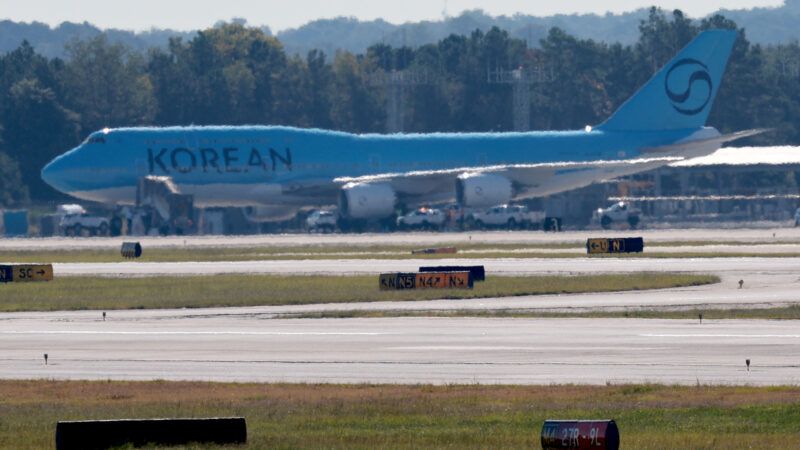Over 300 Workers Return to South Korea After Immigration Raid, but Damage to Trade Relations Is Already Done
“As things stand now,” South Korean President Lee Jae Myun said, “our businesses will hesitate to make direct investments in the United States.”

Over 300 South Korean workers flew home on Thursday after a week in immigration detention following a factory raid near Savannah, Georgia, last week. The incident has jeopardized America's relationship with one of its closest allies and could chill many of President Donald Trump's domestic manufacturing goals.
The group, which included 316 South Korean nationals, 10 Chinese nationals, three Japanese nationals, and one Indonesian, boarded a chartered Korean Air flight and will arrive in South Korea late Friday afternoon. The flight, originally scheduled to leave on Wednesday, was delayed by Trump, who wanted to discuss with Korean officials whether the workers should stay in the U.S. to complete the electric vehicle battery plant at which they were detained. South Korean Foreign Minister Cho Hyun thought it best for the workers to return home, due to their shock and exhaustion, and consider reentry at a later date, a South Korean official told NBC News.
Cho met with Secretary of State Marco Rubio on Wednesday to secure the release of workers and negotiate their voluntary departures, rather than deportations, which would block their ability to reenter the U.S. for up to 10 years. During his visit, Cho proposed the creation of a new visa for South Korean workers. The foreign minister also objected to U.S. officials transporting the workers from the immigration detention center to Atlanta's Hartsfield-Jackson Airport in handcuffs, saying they weren't criminals.
Although Cho said Rubio provided assurances that South Korean workers would be able to return to the U.S. for future work without restrictions, concerns remain around the country's heavy investments in U.S. manufacturing. South Korean President Lee Jae Myung warned on Thursday that if problems, such as obtaining visas, continued, it would have a "major impact" on future investments.
The raid took place at the construction site of an electric vehicle battery factory, a joint venture between Hyundai Motor Group and LB Energy Solutions, on September 4. Touted as the "largest single-site enforcement operation in the history of Homeland Security Investigations," 475 foreign workers were ultimately detained by immigration agents.
While immigration officials claim the workers were detained for offenses ranging from crossing the border illegally to overstaying their visas, one South Korean official told The Wall Street Journal that many of the South Korean nationals were working as instructors and had the appropriate visas, like the B-1 Temporary Business Visitor visa. Leaked documents also reveal that immigration agents were aware that at least one South Korean worker was detained despite having a valid visa, adding to the growing list of mistakes immigration agencies have made while trying to meet Trump's mass deportation goals.
News of the raid shocked South Korean officials and investors and may have significant consequences for relations between America and one of its largest foreign investors—which recently pledged hundreds of billions of dollars worth of investments in U.S. projects and energy purchases. In a news conference on Thursday, Lee said the South Korean workers detained "were there not as long-term or permanent workers but as technicians who helped install facilities and equipment." Workers with specific skills are required to build the factory, "but you can't find them in the United States. Nor does it give visas for them to stay and work," Lee continued.
"As things stand now," Lee said, "our businesses will hesitate to make direct investments in the United States."


Show Comments (37)